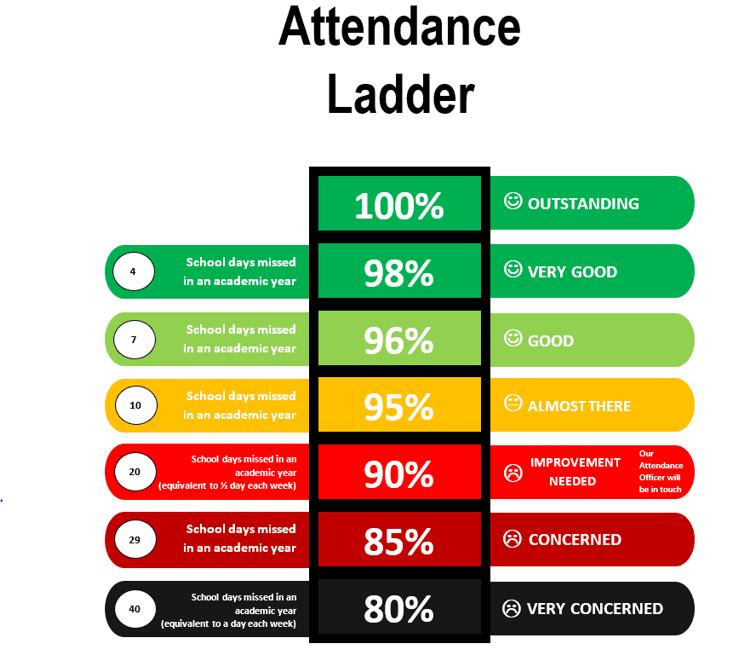Attendance
Attendance matters
Parents have a legal responsibility to send their child to school.
Parents:
- Must make sure their child is regularly attending school or 'otherwise' (i.e. another suitable alternative)
- Are guilty of an offence if their child doesn't regularly attend school
This is set out in section 7 and section 444(1) of the Education Act (1996).
The DfE reiterates that responsibility for ensuring attendance lies with parents, including care givers or anyone with 'parental responsibility', in its statutory guidance for schools on page 5.
Eastlands Primary School supports good attendance by: -
- Developing and maintaining a whole-school culture that promotes high attendance & punctuality
- Having a clear attendance policy which staff, pupils and parents can understand
- Accurately completing admission and attendance records
- Having effective day-to-day processes in place to follow up on absences
- Regularly monitoring and analysing attendance data to identify pupils or groups that require extra support, and put strategies in place to support their attendance
- Building strong relationships with families to understand and attempting to remove barriers to good attendance and punctuality
- Sharing information and work collaboratively with other schools, Warwickshire LA and other safeguarding partners to support attendance
|
Persistent absence (PA) |
Severe absence (SA) |
 |
||||
| A pupil misses 10% or more of school – equal to 1 day or more every 2 weeks | A pupil misses more than 50% of school | Summary table of Responsibilities | ||||
|
EPS will:
|
EPS will :
|
|
||||
Schools and LAs can take legal action if a child has poor attendance or repeated unauthorised absence.
|
Options include:
|
Click icon above for Warwickshire guidance on Attendance |
|
|
Click above for Warwickshire guidance on non attendance |
||
Absence is permitted in certain circumstances
The DfE’s attendance guidance (see pages 56 to 60) explains that schools should authorise absence for:
- Illness, including mental illness, unless they believe the child is not actually ill
- Medical or dental appointments, where it is not possible for the appointment to take place outside of school hours
- Days exclusively set apart for religious observance by the religious body to which the parents belong – one day is given in any one term.
- Traveller pupils, where their families are travelling and this has been agreed with the school
Authorising absence in 'exceptional circumstances'
Headteachers should only authorise a leave of absence in ‘exceptional circumstances’ (see page 56 of the DfE's guidance).
A family holiday is not considered an exceptional circumstance and any application by parents needs to be made in advance. If a headteacher does grant leave, they must specify the number of days the pupil can be away, and a leave of absence cannot be granted retroactively. It will be considered unauthorised absence.
EPS consider exceptional circumstances to be: -
- Death or illness of a close relative
- Wedding or funeral of an immediate close family relative
- Religious observance
- Sporting event or performing art at county or national level if the child is participating
Judgement will be used to decide how many days to authorise the absence based on individual circumstances.
Factors to inform this decision include: -
- Why the pupil needs to be absent – such as, in the case of a bereavement, how close the pupil was to the family member
- Whether the absence would include a long journey – consider reasonable timescales for completing the journey
- The anticipated day of return, and whether any circumstances (such as travel complications) may lead to the pupil not returning to school on that day
- You should also consider any possible safeguarding risks to the pupil – for example, if the pupil would be travelling abroad to a potentially dangerous location.
Find out more about pupil term-time absence, including how schools and LAs have defined 'exceptional circumstances'.


























